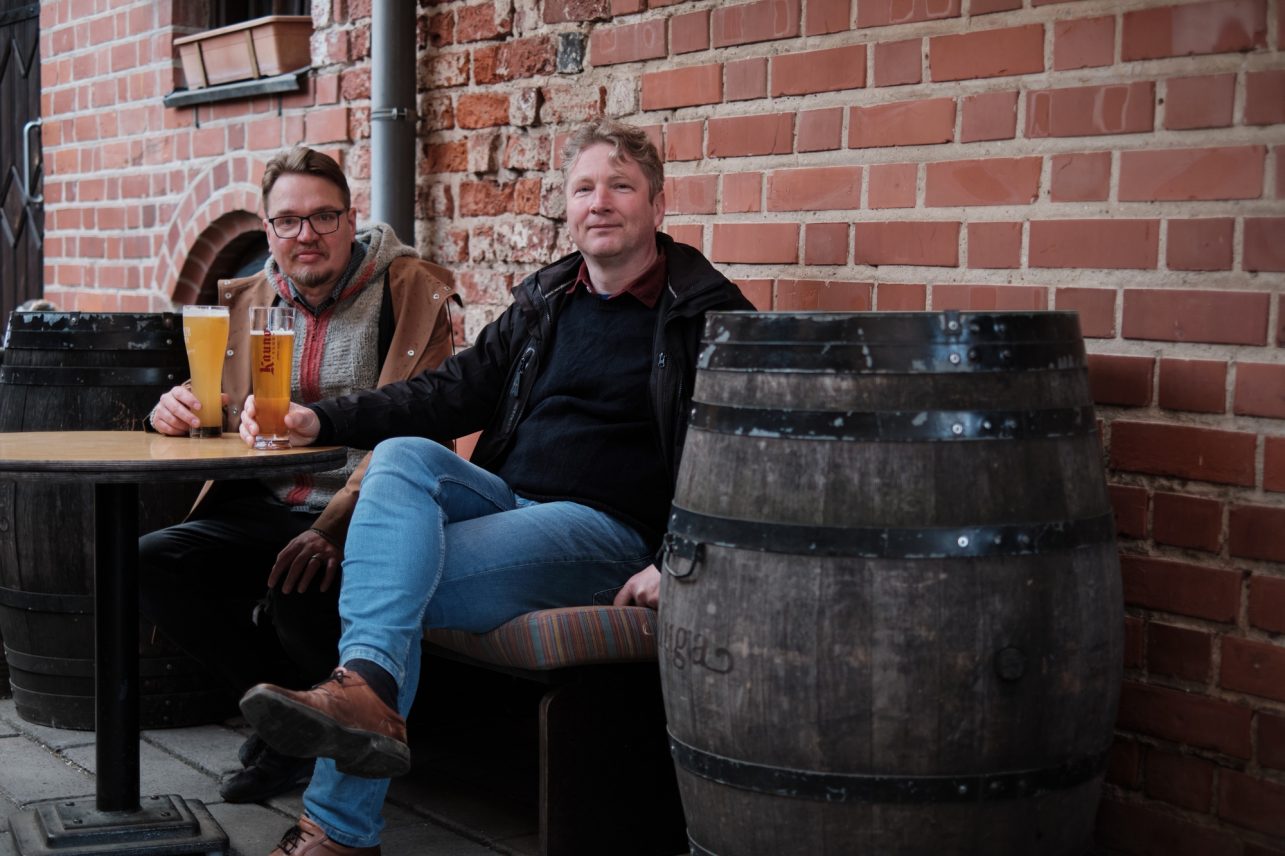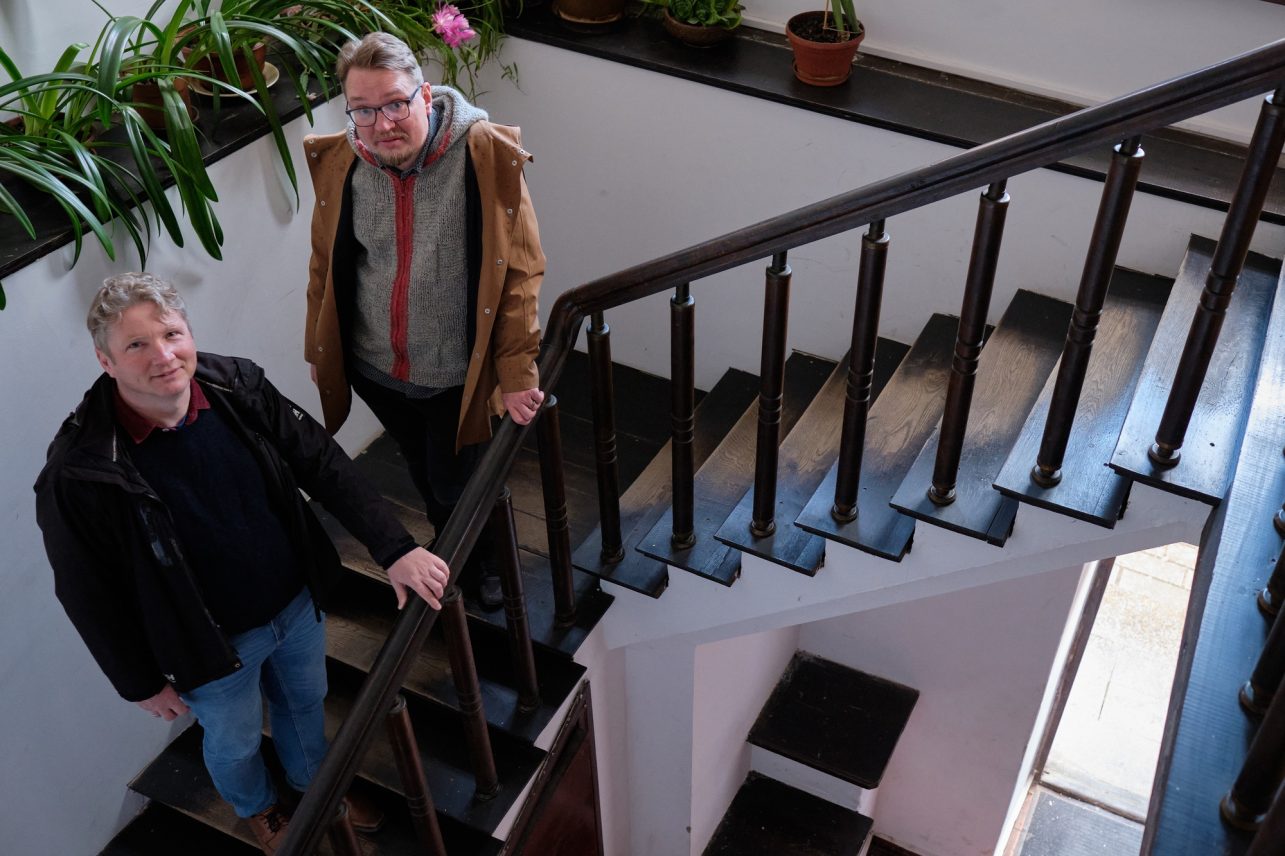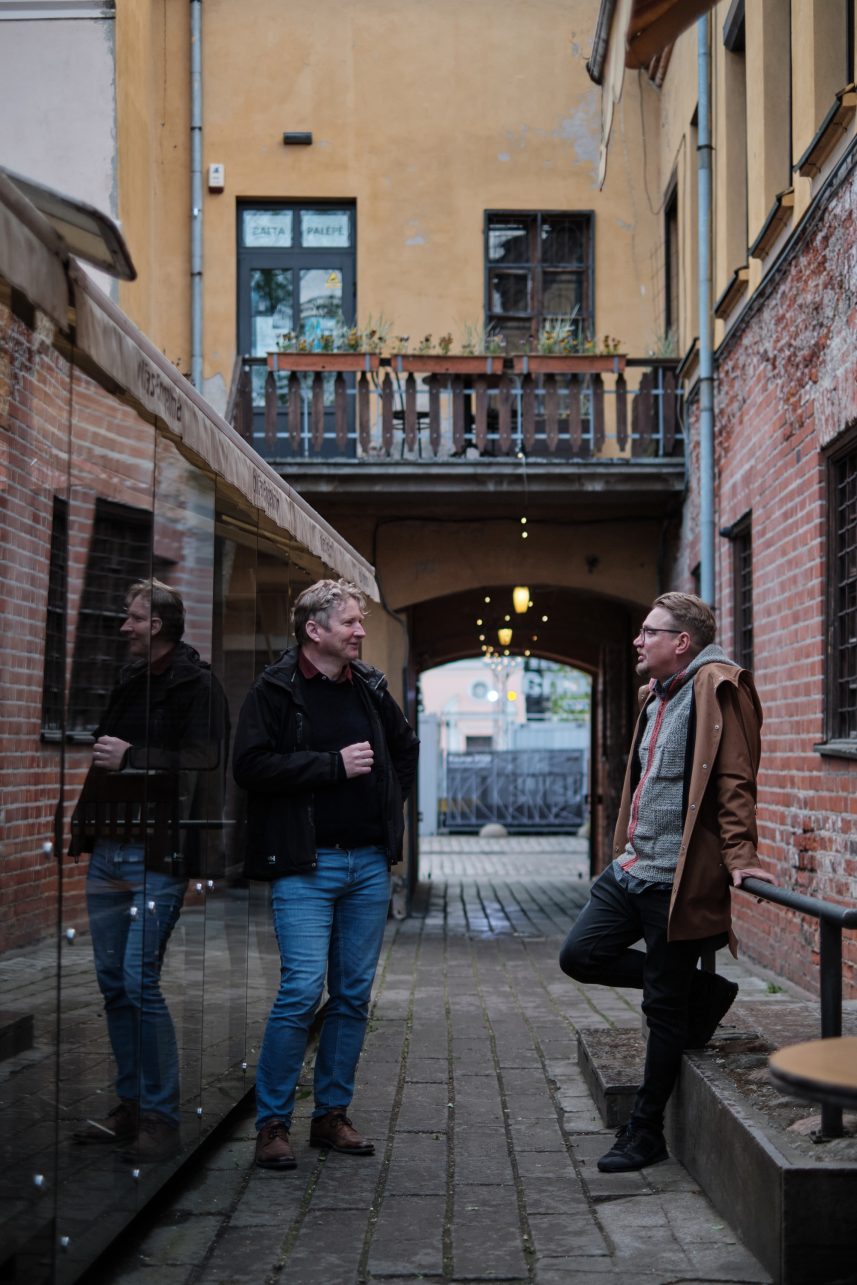Standing by the legendary Kaunas bar Skliautas, famous for its songs and intellectuals, I saw artist Reiu Tüür on the horizon. To my surprise, as soon as he approached, he greeted me in Lithuanian. It turns out that in preparation for the interview, I missed an essential fact – one of the interlocutors can speak Lithuanian fluently. I don’t know why this surprised me so much, but all the time while waiting for another story hero to join us – the painter Peeter Krosmann – I smiled. I smiled no less after the three of us had a conversation – these two really love Kaunas.

You both came here from Estonia. What is one thing you love the most about Estonia? What’s the difference?
Reiu: There is a myth that on every board of the world you can find at least two Estonians and Kaunas there is this old Smetona port and you have two Estonians.
Most of the things we have in Estonia as a benefit you can also find here, so I feel like I never left Estonia. And I don’t feel like an emigrant at all. People say „Estonians are our brothers“ – and I feel that I’m appreciated here as a foreigner. Also, together with Peeter, we had an exhibition in „Galeria Urbana“ and it was called „Both Estonians of Kaunas“.
And I really wanted to conclude everything with an anecdote about our slowness – „Everybody is afraid of time, but time is afraid of Estonians“.
Peeter: Good but also a really hard question. I think I feel a little bit the same as Reiu – I don’t feel that I left my home. It’s much closer than you think. But I’m going to answer by going around the question – before I came here to live, I had been twice in Lithuania and this country seemed to be far away. So I had to come here often to realize how close it was and how similar it was.
I don’t usually think about things that I miss about Estonia, but I love forests. I was born in Pernu but I lived there only for 6 years – it’s near the seaside. After that, my parents moved to Tartu, but I have always been more a fan of forests than open spaces. Maybe sometimes I miss deep Estonian forests. Somewhere deep in my heart. And sure, sometimes I also miss my family and friends. But at least I have one Estonian friend here, in Kaunas with whom I can talk in Estonian if I start to miss the language. But I’m not sure if I answered the question. It’s all somewhere around.
Reiu: I guess it’s an Estonian way to answer the questions.
How long have you been living in lithuania?
Peter: I have lived in Lithuania for 5 years now. Sometimes I feel a little bit ashamed that I still don’t speak Lithuanian.
Reiu: The same thing happened to me – don’t worry.
Peter: It takes time, you know.
Reiu: Especially for us, Estonians.
Peter: You know, we’re slow so I have a good excuse. It will come at some time, I promise.
Reiu: For me, it was 7 years. After that, I finally started to speak. Now it’s been 13 years since I’ve lived here.
You mentioned a joke about Estonian slowness. How do you react when people make fun of it?
Reiu: In the North you have to be slower. You need to plan trips and be more pure to the nature because nature is always stronger than you – it’s cold and you need to survive. You cannot spoil your energy by running around as fast as you can. There is an anecdote that the Russian military is probably mad because the Estonian military have special forces who are killing Russians with boredom.
Now I would love to ask a few questions of you individually. Let’s start with Reiu. While I was reading your biography, I saw that one of your first steps towards becoming a professional artist began around 1988, when you finished art academy. Did you improve your understanding of what art is or some of your specific skills?
Reiu: I never waited to finish something. Some people wait for this diploma or other things, other people even say that life starts when you finish university. And I did a lot of exhibitions in my first course and made exhibitions in museums in the Vaal gallery. I did it everywhere where you can make it.
I was actively working on it and making professional art in the first course. After finishing university, I was already rector of my own institution. It means that I had my university made from scratch with my friends. I was conducting it, making paperwork and talking with the ministry, managing bills and educational sector people who would be motivated enough to teach. We had quite a good level of professionality. That’s how it started. I think my most active years of painting were in 1993 or 1994 when I had a lot of exhibitions in Finland, Germany, England, and a lot of other places. I was kind of desperate and I thought that it’s so important to make exhibitions and be known. But after a while, I even had an exhibition in Germany and I never told anyone in Estonia that I had it. I kind of made it for my happiness. But I’m really happy with art in my life.

From what I read, Peeter, it sounds that your beginning started pretty similar as Reiu but a bit later. You studied in Konrad Mägi studio in 1989 and then obtained a bachelor’s degree in painting from the University of Tartu. What did your studies look like?
Peeter: It was a strange time at the time when everything started. The things that didn’t happen before, started to happen. Konrad Mägi studio was basically as Reius university – it was about traditions, we had three or four teachers. Two very active and the other very supporting. And it was all about impresionating. I had quite a strong basement of what to build my painting of. But I wouldn’t say that was the beginning of my professional journey. I just was young and wanted to be a painter. It’s far from the idea that one day I’ll be a professional. it’s more like starting a rock band – for girls to like you. Professionalism is almost the last thing you think of. In our kind of society you have to have some kind of education so people in this field would accept me as a professional.
In some ways I can say that my professional painter’s life started in kaunas. I don’t want to say that I was a very bad painter before but I was trying to survive and there is a big difference. When you’re trying to survive and you’re already doing this – it’s different. It takes time until you become professional. It comes later.
Reiu: I agree. You need to get connections to develop. Not only friends but also art connections so you could start to learn from them. Sometimes you really need to change your landscape.
Peeter: Especially when you go to foreign country. I really feel like home here but I still feel some slight difficulties from time to time. And you must take yourself together a bit differently than you did yourself back home. I think I’m not gonna lie by saying that my professional journey started five years ago, in Kaunas.
Reiu, your works have been exhibited in galleries in New York, Tallinn, Riga, Tartu and many other cities. The Great Bridge is your fourth or fifth personal exhibition in Lithuania, right?
Reiu: I don’t count my exhibitions, to be honest. For me – it’s not important. It’s more about doing art. It’s like having a nice walk in the park – it’s huge part of my very personal life. I desperately don’t see that I need to do something to become famous or someone else than I’m. I only do paintings because I can’t not do them. And this is part of my everyday life. Someone loves fishing, someone likes to grill – I love painting. I like to do it calmly, I don’t do them just to sell them.
Peeter, you are mostly known as a cultivator of traditional painting genres. What do those genres of traditional painting consist of? And what about the technicians? I read that you often go into diversity.
Peeter: I must start with the fact that most of the stuff that people say about painting is bullshit. Even painters think they talk bullshit but we all have to. And it’s really hard to talk about your paintings or what you are painting. That’s the main reason why we just think of something that goes with the trend and then just say it.
Also, I don’t think that I’m very traditional now. I think that I got it from these first 5 years, the knowledge that you can turn into anything. I envy people who early in their life have something very clear, are enthusiastic and happy with it. Talking about myself, I always tried to find new roads. Every time I learn something – it helps me to move on. If we have to be very correct about Peeter Krosmann as a painter, then we should say that he doesn’t have one concrete description or he’s always changing it. It’s been moments when I have been quite bad at what I’m doing and it’s because I tried to learn something new.
Reiu: That’s wrong.
Peeter: No, it’s not. You’re not as professional as the person who is doing the same thing over and over again. I can’t compete with an artist who started when they were 20 and have been doing this image of a rose for 30 years. They’re doing this image one thousand times better than me but I have tried lots of different things and it helps me grow.
Let’s get back to the main topic I wanted to talk about. How did you end up here, in Kaunas?
Peeter: We can almost say the same thing with the same voice. We are love refugees. We both found wives who lived in Kaunas and that’s it.
Reiu: And they’re the happiest here, in Kaunas. I have a writer who tried to live in Scotland but understood that the best place to live for her is Lithuania. And what’s better than having your beloved woman live in the best place for her? You can just make some workaround by being next to her.
Peeter: I agree. I can’t say what my love Miglė thinks but she lives in Kaunas. She’s an artist. And I am really happy that she lives here. When I fell in love with her, she was living in Panevėžys but she moved.
Reiu: Somehow Kaunas has a lot of cultural people to fall in love with.
And how do you feel today, being here, in Kaunas old town, a legendary bar called Skliautas? Why Skliautas?
Reiu: I chose this place. When I was living in Vilnius, I always went to Etmonų Špunka – I was living next to that place. Talking about Skliautas, I have the most home feeling here.I didn’t find anywhere else that feeling yet. Every time I come here, I always meet at least 10 people that I know. And I can talk with them or ignore them – It’s my choice.
Peeter: I also have a place like this in Kaunas, but it’s not Skliautas. I like it here but I like Vingiu Dubingiu the most. Reason – it’s near to my home. It’s quite easy for me to go there for a few drinks and then straight home. Also, I’m really happy about the beer choices there – that’s the good argument why I recommend going there. And I started to recognize people there also. It feels good. I always wanted to have a home bar where you know at least two people.
And how did you meet each other? Did your exhibition “Diapozityvas” have anything to do with it?
Reiu: Fun fact, I had a lot of beers with Peeters brother some time ago. His brother is a philosopher, so I knew the last name of Krosmann. One day in Vilnius, Užupis, I visited Užupio meno inkubatorius where a lot of international artists used to come often and I saw that Estonian artist are coming. I never saw him before and didn’t know what kind of art he does but I invited him to go to Etmonų Špunka to get some beers. We shared lots of glasses of beer, and lots of ideas and I think we influenced each other. I got much more tolerant of the crafts and hard-working kind of art and I think that Peeter got other things from me.
Peeter: Reiu is a 100 percent more honest artist than me. I try to live from painting and he doesn’t – automatically it makes him more honest than me.
Reiu: But I’m dedicating way less time to this.
Peeter: Yes, bet you never think that you have to sell it.
Reiu: True, I never thought about it.
Peeter: Now about Diapozityvas. It was the beginning of our friendship. When you meet someone you have a connection with, the same ideas, and the same attitude, you learn from each other and you want to do something together. And for artists, one of the versions of doing something together is an exhibition. You’re doing an exhibition to put something together that hasn’t ever been.

Do you find time to enjoy the fact that you live in the European Capital of Culture?
Reiu: I do. I visited William Cambridge at the opening of the exhibition, Yoko Ono, MoFu 360/365. Of Course, I had some friends come to listen to Marina Abramovič – I joined them. The strongest impression for me was that walk through a Japanese wall. Also, Kaunas Biennial „Once Upon Another Time… gyveno jie jau kitaip“. Incredible. These kinds of activities make me proud and happy of the city I live in.
Peeter: What year will be Tartu?
Reiu: 2024 year.
Peeter: Good. About Kaunas being the European Capital of Culture – I have been enjoying it. I think I still will go back to William Cambridge. Even if it would be the only exhibition during the European Capital of Culture here, in Kaunas, from my perspective, it would still be a success. I felt that I got enough information for a year. It doesn’t mean that other things are less important, it’s just the best thing I saw at the moment.
Reiu: I mean Yoko Ono and Ukraine war – „Make love, not war“. Such a good connection.
Peeter: Probably it’s a good time to tell you that I haven’t been there yet and it’s on my way from home to my studio. I pass through the bank of Lithuania, where the exposition is located, at least twice a day and I haven’t been there. I understand how important everything is but sometimes I just get a little bit tired of it and I need a quick rest. But I will. Everyone should.

